MercoPress. South Atlantic News Agency
Tag: European Union
-
Monday, July 24th 2017 - 07:07 UTC
Mercosur and Colombia agree to a limited list of tariff-free products

Mercosur inked a trade deal with Colombia last Friday to allow limited quantities of tariff-free trade in products including automobiles, textiles and agrochemicals, Argentina's and Colombia's governments said.
-
Sunday, July 23rd 2017 - 12:23 UTC
Bank of America moves European operations to “natural location” Dublin
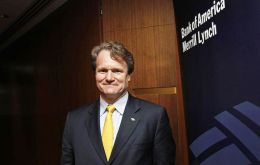
The Bank of America announced Friday that Dublin will be the new base for its European Union operations following Britain’s decision last year to split from the EU. Brian Moynihan, CEO of the Charlotte-based bank, made the announcement during a trip to the Irish capital city. It becomes the latest large U.S. bank in recent weeks to disclose plans for continuing to serve clients in EU countries following the so-called Brexit vote in 2016.
-
Saturday, July 22nd 2017 - 12:31 UTC
Hammond reportedly told Goldman Sachs he favors a Brexit lengthy transition period
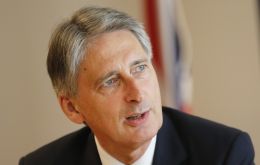
Chancellor of the Exchequer Philip Hammond reportedly told the board of U.S. investment bank Goldman Sachs that he was pushing for a lengthy transition period after Britain leaves the European Union, a source familiar with the talks said. The source said Hammond made a presentation to the Goldman Sachs board on June 29 when CEO Lloyd Blankfein was in London for the annual board meeting.
-
Friday, July 21st 2017 - 08:49 UTC
Brexit second round with EU ends with “fundamental disagreements”
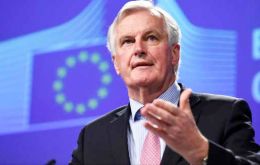
The second round of Brexit talks has ended with “fundamental” disagreements remaining between Britain and the European Union on citizens’ rights and a stand-off over the so-called “divorce bill”.
-
Tuesday, July 18th 2017 - 05:43 UTC
Complicated start for Brexit discussion in Brussels; PM May orders cabinet to stop infighting
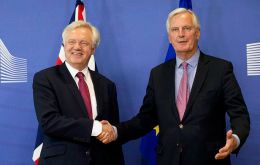
Negotiations regarding Britain's exit from the European Union resumed on Monday in Brussels, and Britain's prime minister warned her feuding cabinet to stop its infighting. David Davis, the Britain's Brexit secretary, began four days of talks with EU chief negotiator Michel Barnier in Brussels, but flew home to London after only three hours of negotiation.
-
Monday, July 17th 2017 - 04:12 UTC
France seeking to disrupt and degrade UK's financial sector, claims City of London
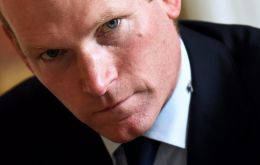
France is actively seeking to exploit Brexit to disrupt and degrade Britain’s lucrative financial sector, a senior City representative has warned. Former foreign office minister Jeremy Browne, who acts as the City of London’s envoy on Brexit, said the French see the British as “adversaries” in the forthcoming withdrawal negotiations.
-
Saturday, July 15th 2017 - 07:42 UTC
Blair argues Brussels leaders willing to compromise to avoid UK leaving Europe

Tony Blair believes European leaders would be willing to tighten up the free movement of people as a way to avoid Britain leaving the EU. The UK former prime minister suggested the “will of the people” may be changing as the difficulties of Brexit negotiations become apparent and called for a “proper debate” over the different options, including remaining in a reformed EU.
-
Wednesday, July 12th 2017 - 21:26 UTC
Brexit divorce bill: “I’m not hearing any whistling, just the clock ticking” says EU chief negotiator
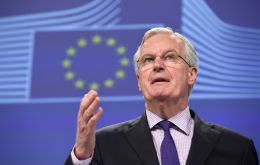
European Union’s chief Brexit negotiator has slapped down Boris Johnson over his claim that Brussels could “go whistle” if it expected large sums from Britain as part of the withdrawal agreement.
-
Wednesday, July 12th 2017 - 05:51 UTC
Exit Brexit secretary laughs at Johnson's comments; Corbyn calls them silly arrogant remarks
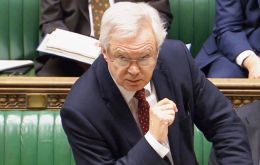
UK is already challenging Brussels over its Brexit divorce bill plans, David Davis has said as he laughed off concerns about Boris Johnson’s controversial suggestion the EU could “go whistle” if it makes “extortionate” demands.
-
Wednesday, July 12th 2017 - 05:32 UTC
EU can “go whistle”, says Boris Johnson of Brexit divorce bill
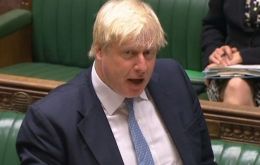
Foreign Secretary Boris Johnson has told MPs the European Union can “go whistle” for any “extortionate” final payment from the UK on Brexit. He added the government had “no plan” for what to do in the event of no deal being agreed with the EU.
